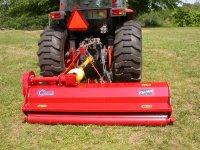In North Carolina, most times the state is the entity responsible for the roadside mowing. During dealings with NCDOT, the engineer made it clear to me that there is no other authority over any public road in NC.
Although I see both flails and rotary mowers in use, the rotary is more common. In broad areas, I mostly see rotary batwing rotary mowers doing the work. Rotary mowers are more energy efficient than flails. They are also more robust in cutting woody plants.
Frequently, the state uses boom mowers. Most of the time, this to do mowing several feet to the right of the tractor, but mostly in the horizontal plain. Sometimes the boom operated offset mowers are flail, but most of the time they are rotary because they are often used to de-limb trees along the right of way, and this is mowing vertically.
Personal opinion: A flail is less fuel efficient but is likely to be easier on the drive line of a PTO.
A rotary although more efficient energy wise, would be harder on a PTO driveline, but in my view, it is more manageable on a boom application where the final drive is hydraulic. The stored energy of the blade system is available to be applied directly to a woody plant, and the tip speed of the rotary is easier to maintain at reasonable hydraulic motor speeds.
I believe that the difference in safety is often overblown, and in the situation where the road crews are mowing vertically, the safety difference is non-existent, and the decreased effectiveness of the flail works to it's detriment in the selection process.
I believe that much of the mowing is being done by independent contractors, who maintain their own insurance. I believe a 50M dollar settlement would be more likely to be awarded in a criminal negligence suit, but would be very unlikely to be awarded otherwise, since most jurors are smart enough to know the difference, and many would be mindful that it ultimately comes out of their pockets in any case. I think it is often harder to go after large governmental entities than most would presume, and risk analysis would have to balance the risk of a possible suit against the certainty of the increased fuel and maintenance costs of going to flails across the board.

